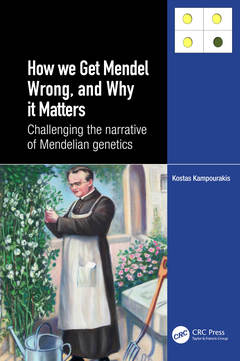How we Get Mendel Wrong, and Why it Matters Challenging the narrative of Mendelian genetics
Auteur : Kampourakis Kostas

This book illustrates that the stereotypical representations of Gregor Mendel and his work misrepresent his findings and their historical context. The author sets the historical record straight and provides scientists with a reference guide to the respective scholarship in the early history of genetics. The overarching argument is twofold: on the one hand, that we had better avoid naïve hero-worshipping and understand each historical figure, Mendel in particular, by placing them in the actual sociocultural context in which they lived and worked; on the other hand, that we had better refrain from teaching in schools the naive Mendelian genetics that provided the presumed ?scientific? basis for eugenics.
Key Features
- Corrects the distorting stereotypical representations of Mendelian genetics and provides an authentic picture of how science is done, focusing on Gregor Mendel and his actual contributions to science
- Explains how the oversimplifications of Mendelian genetics were exploited by ideologues to provide the presumed ?scientific? basis for eugenics
- Proposes a shift in school education from teaching how the science of genetics is done using model systems to teaching the complexities of development through which heredity is materialized
Preface: “Gregor Mendel, the first geneticist”. Part I Anachronistic Mendelism. Chapter 1 Mendel was not a geneticist ahead of his time. Chapter 2 Mendel was a brilliant experimentalist of his time. Chapter 3 Speculating about heredity. Chapter 4 The path to genetics. Chapter 5 The reification of the “lonely genius”. Part II Social Mendelism. Chapter 6 Mendel’s great defender. Chapter 7 Chromosomes, “factors” and genes. Chapter 8 “Mendelian” eugenics. Chapter 9 Geneticists’ attitudes towards “Mendelian” eugenics. Chapter 10 Mendelian genetics and the Nazi racial hygiene. Conclusions: Emending the teaching of school genetics.
Kostas Kampourakis is the author and editor of several books about evolution, genetics, philosophy, and history of science. He teaches biology and science education courses at the University of Geneva. He is the co-editor of Teaching Biology in Schools and What is Scientific Knowledge, both published by Routledge.
Date de parution : 12-2023
15.6x23.4 cm
Date de parution : 12-2023
15.6x23.4 cm



